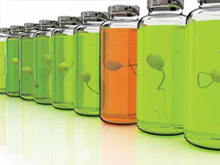Health Topics
-
Healthy Living
-
|
|
April 2012
|
| Is Sperm Banking For You? |
| Dr Ajit Saxena & Dr Chitra Ramamurthy |
| |
 |
Anil and his wife were a happy couple married for a year when family pressure for an heir drove them to seek gynaecological advice on his wife’s failure to conceive. As things would have it, a series of tests and after, the gynaecologist referred Anil to a urologist. |
The latter subjected Anil to semen analysis and got them to the root of their problem – Anil did not have any sperms in his semen
Infertility in men – what is our level of awareness and where do assisted reproduction techniques come into play when infertility in a couple has the man as the factor?
What Can Go Wrong?
- The testes, for whatever reason, may be incapable of producing fully mature sperms. The sperms remain in the testes and only the few that are mature, come out. It is a condition called oligospermia, commonly referred to as a case of low sperm count.
- Sperms are totally absent or they are not produced at all – a condition known as azoospermia.
- The sperms may be fully mature but a blockage in the passage (usually at the beginning of the tube or vasdeferens) prevents its release from testes.
- Lifestyle aspects too can contribute to low sperm count or infertility in men: smoking, use of aerosols (deodorants), stress, irregular working hours and unhealthy diet are among them.
- Occupation-wise, software executives and others whose work requires them to
spend a lot of time in proximity to computers are in danger of having
low sperm count. Prolonged use of laptops, kept on laps, generates heat that affects the testicles and lowers sperm count.
- Sportspersons who indulge in hormonal abuse are also at likely risk of infertility.
|
What Are Sperm Banks?
The clinical process of storing sperms requires that they be cryogenically frozen in liquid nitrogen. Frozen sperms regain their motility when thawed, though quality-wise they will be inferior to fresh sperms. A batch of frozen sperms can remain viable for up to 18 years or so, and they can be used successfully in artificial conception techniques like in-vitro fertilisation or intra-uterine insemination. Sperm banks, as they are called, provide men – who require it – the clinical infrastructure facility for storing their sperms and the assurance of security against misuse of their sperms. |
Is there a remedy?
Exercise can go a long way. It releases hormones, especially testosterone, which is good for a healthy sperm count
The No Way Mark and Recourse To Sperm Banking
At times, conception is not possible even though both partners are normal. A more common situation is when the female partner is not ready to bear a child. These days distance is also a problem. Work or career keeps partners away from each other for long durations and conception is not achieved.
Conception is also not possible when the man is a patient of testicular cancer undergoing chemotherapy. All these are situations, where sperm banking comes into play offering the affected man the continued hope for a biological child of his own. In an entirely different
context, men may also donate sperms anonymously for altruistic or financial reasons wherein the banked sperm is used to help infertile couples or single women conceive.
Locating A Sperm Bank
Sperm Banks are found all over the world. In India sperm banks are located in many major cities. Sperm banks should be attached to a good lab – a clinic, where doctors are well versed with infertility issues, and has the service of lawyers to handle ethical and legal issues. The cost of the clinical infrastructure and the responsibility for proper labelling and security of the sperms deposited with them, makes sperm banking an expensive affair for
both the service provider and the client. There is usually an annual maintenance charge which is levied for as long as the sperm is banked.
Process Of Sperm Banking
Sperm banks take a number of steps to ensure good quality of the sperms.
- They usually have a strict screening procedure before selecting a donor.
- The donor should be a healthy male aged between 18 and 45 years.
- Donors must be willing to undergo frequent and rigorous testing.
- They must be willing to donate sperms to impregnate women who are unrelated to and unknown to them.
- They must agree to relinquish all legal rights to all children who result from their donation.
- The donor histories regarding familial or genetic diseases are recorded.
- He is tested for cancer, jaundice, HIV and other sexually transmitted diseases.
- Any bleeding disorders are checked with appropriate blood tests.
Donor Choices
- Women may select sperms from donors whose physical features resemble their own partners.
- Sperm banks will maintain the confidentiality of the donors.
- Information’s regarding the donor’s race, height, weight, blood group, health and eye colour will be available for the sperm recipients.
- Info on the family history and educational achievements of the donor too may be revealed to the recipient party.
Sperm banks may also supply sperms for research or educational purposes. As with other forms of third party reproduction, use of donor sperms from sperm banks may also have its own moral, legal and ethical issues |
|
|